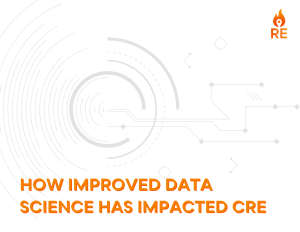Feature
The Impact of Improved Data Science on the Commercial Real Estate Industry
The commercial real estate data science revolution is well underway. More CRE property managers and investors have come to realize that the data doors have been unlocked, and improved data science is changing the way business is done in the industry as a whole.
Why Commercial Real Estate Lags Behind Residential Real Estate in Adopting New Tech
The CRE data science revolution shouldn’t be too surprising given that the shift began in the residential real estate industry. Historically, the residential sector is faster to adopt new technology, which provides a look at what could be in store for commercial real estate.
This trend has been clear in the rise of listing aggregation websites like Zillow. Instead of fighting it, many real estate agents and brokers ended up advertising on Zillow, understanding that it could be a highly profitable marketing channel. Residential agents and brokers were also quick to take advantage of advanced marketing automation that utilizes lead capture and CRM data.
So, why is commercial real estate behind the curve compared to the residential real estate industry? There are a few factors at play. For one, the CRE industry is much less agile. Change in general comes at a much slower pace. The higher stakes also play a role. Property transactions are more complex, involve a lot more money and are made on a more personal basis.
The latter factor makes the commercial real estate industry more guarded. CRE brokers and investors are much more protective over their commercial real estate data. That has made portfolio and property managers resistant to the idea of data management platforms. However, the benefits of improved data science have opened the minds of CRE insiders that are beginning to understand data management can help the industry grow rather than disrupting how business is done.
The Hurdles of Technology Adoption in Commercial Real Estate
Some who have seen the technological transformation in the residential real estate industry have wondered why it took the formation of the entire PropTech industry for commercial real estate firms and professionals to see the benefits of technological advancement.
The simple answer is they didn’t see the potential for their business. The initial reaction was to resist change and protect the status quo that they knew. Many portfolio managers and property managers were also unclear on how to incorporate the new tools at their disposal. It wasn’t until sophisticated data management platforms like RefineRE gave CRE managers a look at what could be achieved that they began to consider adjusting their technology strategies.
The next hurdle was how CRE portfolio and property managers could turn data insights into action. There’s little understanding of how technological tools work and how they can be incorporated into an existing framework. Currently, over a third of CRE owners are still testing out tools and formulating their technological strategy.
The latest stats suggest that CRE technological tools are adopted first and foremost to optimize operations, which has not been traditionally seen as a value-add until the data science revolution. CRE owners are most likely to invest in management and system automation tools. They are also interested in using technology to learn more about tenant experience.
There’s growing interest in data analysis now that there are simplified solutions for aggregating information and reporting data without the help of a specialist. Many commercial real estate firms have delayed investing in technology simply because they felt they didn’t have anyone on their team who could properly utilize the tools. That’s led to concerns about the return on investment.
Major players in the CRE industry aren’t delaying the inevitable any longer as they realize the long-term gains that can be made through improved data science. They also understand that if they don’t adjust their strategies they risk falling behind the competition and losing relevance. With that in mind, CRE firms and companies are revisiting their business strategies and basing them on technology that leverages both internal and external data.
Catch up on the latest from RefineRE:
Data Science Use Cases in Commercial Real Estate
Commercial real estate companies and investors are still in the early stages of adopting data science, but the stage is set for major changes industry-wide in the near future. But what will commercial real estate data be used for?
A recent survey from EY Research found that 69% of commercial real estate owners plan to incorporate technology into their strategic agenda. Today’s commercial real estate owners have a growing interest in leveraging technology to:
- Reduce operation costs
- Improve operational efficiency
- Increase income
- Create new revenue streams
- Access new data points for analysis
- Improve investment decisions
Currently, most CRE companies are investing in just one or two tools rather than creating a full technology strategy. In order to do that, commercial real estate owners and managers must:
- Choose technology-driven tools that are aligned with the company’s strategic direction and goals.
- Position the business to take advantage of horizon technologies.
- Put emphasis on making better technology investment decisions.
- Focus on scalability and reusability that improves cost of ownership.
- Better understand how business processes are integrated and their interdependency.
- Improve the total cost of ownership by promoting reusability and scalability.
- Streamline architectural diversity to reduce operational costs
- Allow for quicker roll-out of policies.
The process of implementing a technology strategy often requires the assistance of professionals such as data specialists. However, the goal is to create a technology strategy that can be managed internally without outside help.
RefineRE is Leading the Commercial Real Estate Data Revolution
RefineRE is quickly becoming the data resource of choice for corporate occupiers and CRE property managers. The RefineRE data platform is sophisticated while still being intuitive for corporate occupiers with little data management experience. The platform combines data aggregation with analysis and benchmarking for a complete suite of tools that can support your technology strategy.
It starts with a dashboard where all of your commercial real estate data is visible in one place. The Portfolio Manager will also be familiar for CRE occupiers that are currently tracking and analyzing key metrics.
Advanced tools like BenchCore are equally easy to utilize. Being able to benchmark metrics on a global and local scale aids in decision-making and making a business case for your decisions. The Marketing Intelligence tool suite allows you to analyze potential cost savings, risks and value of leases through comparisons and market reports.
RefineRE is expanding the use of commercial real estate data with advanced metrics such as Environmental Social Governance (ESG) tool suite that position CRE firms to be thought leaders in carbon footprint and emissions analysis. RefineRE FLEX can also help property managers transition traditional spaces in flex workplaces that accommodate remote workers. Even your own workspace can be optimized for maximum efficiency and utilization with our Workplace Analytics technology.
Simple use, robust analytics, data-driven decision-making and metrics that bring corporate occupiers into the future can all be found on a single platform from RefineRE. It’s the ideal solution for a commercial real estate industry that’s ready to leverage data science.
Catch up on the latest from RefineRE:
Schedule a consultation with RefineRE
Here's what you can expect:
- ‣ A 15-minute call
- ‣ Identify your biggest challenges
- ‣ Explore automated solutions to optimize your strategy





